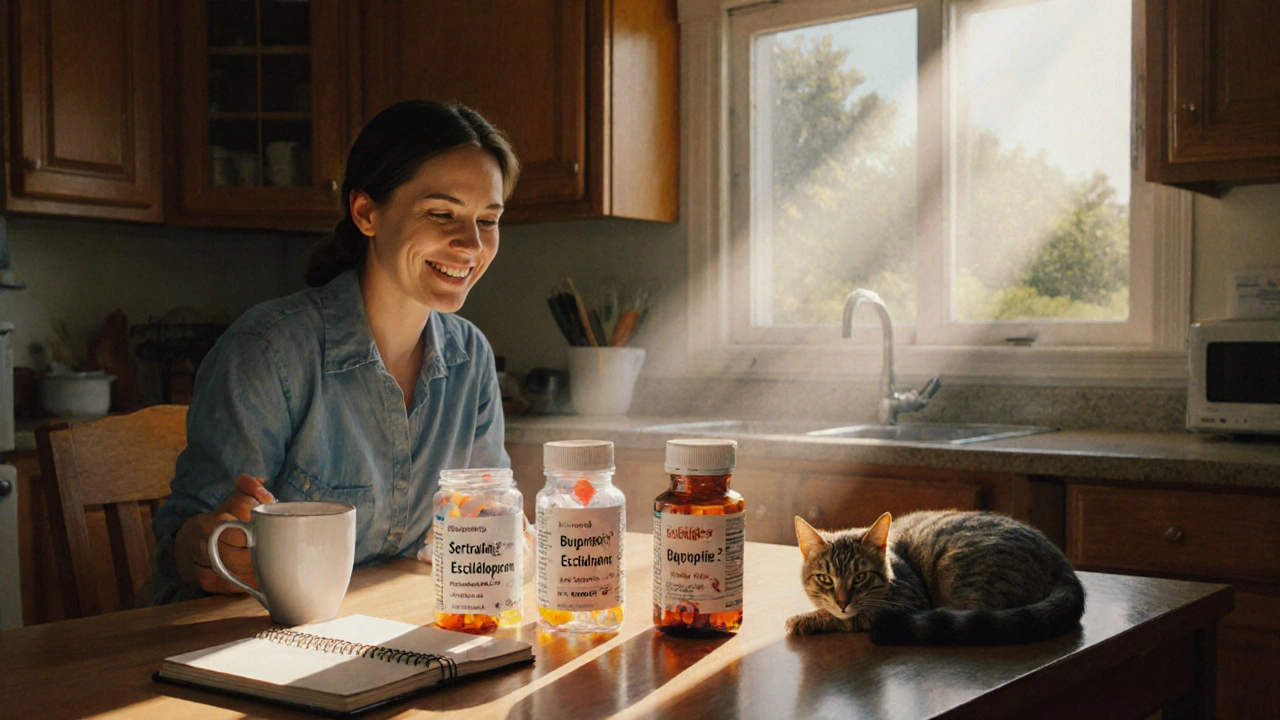Fluoxetine vs Alternatives: What Works Best for Depression and Anxiety

Antidepressant Matchmaker
Find Your Best Antidepressant Match
This tool helps identify which antidepressants might work best for you based on your symptoms and priorities. Remember, only your doctor can prescribe medication.
Fluoxetine, sold under the brand name Prozac, has been one of the most prescribed antidepressants since the 1980s. But if you’re considering it-or already taking it-you might be wondering: are there better options? Maybe you’re dealing with side effects, or the medication just isn’t clicking. Or maybe you’re starting treatment and want to know what else is out there. The truth is, fluoxetine isn’t the only game in town. There are several other SSRIs and non-SSRIs that work differently, have different side effect profiles, and suit different people better.
How Fluoxetine Actually Works
Fluoxetine is a selective serotonin reuptake inhibitor, or SSRI. That means it increases the amount of serotonin available in your brain by blocking its reabsorption. Serotonin is a neurotransmitter linked to mood, sleep, and anxiety. More serotonin in the synaptic space can help stabilize mood over time.
But here’s the catch: fluoxetine has a very long half-life-about four to six days. That means it sticks around in your system for weeks after you stop taking it. This can be good: if you forget a dose, you’re less likely to feel withdrawal symptoms. But it’s also a problem: if you have side effects, they don’t go away quickly. And if you need to switch medications, you have to wait longer before starting the next one.
Fluoxetine is FDA-approved for major depressive disorder, OCD, panic disorder, bulimia, and premenstrual dysphoric disorder. It’s often used off-label for generalized anxiety and PTSD. Many people find relief, but up to 40% don’t respond adequately to first-line SSRIs like fluoxetine.
Top Alternatives to Fluoxetine
When fluoxetine doesn’t work-or causes too many side effects-doctors often turn to other SSRIs or different classes of antidepressants. Here are the most common alternatives, backed by clinical data and real-world use.
Sertraline (Zoloft)
Sertraline is the most prescribed antidepressant in the U.S. It’s also an SSRI, but it has a much shorter half-life-about 26 hours. That means it clears from your system faster. This makes it easier to adjust doses or switch medications if needed.
Studies show sertraline works just as well as fluoxetine for depression and anxiety, but with fewer reports of weight gain and sexual side effects. It’s also approved for a wider range of anxiety disorders, including social anxiety and PTSD. Many patients tolerate sertraline better, especially if they’re sensitive to fluoxetine’s long-lasting effects.
Escitalopram (Lexapro)
Escitalopram is the S-enantiomer of citalopram, meaning it’s the more active part of the molecule. It’s considered one of the most potent SSRIs with the cleanest side effect profile.
A 2023 meta-analysis of 12 randomized trials found escitalopram had the highest efficacy and best tolerability among SSRIs for major depression. Patients reported less nausea, drowsiness, and sexual dysfunction compared to fluoxetine. It’s often the first choice for patients who’ve had bad reactions to other SSRIs.
One downside: escitalopram can cause mild insomnia in some people. But overall, it’s a top-tier alternative if you’re looking for something effective with fewer daily disruptions.
Paroxetine (Paxil)
Paroxetine is another SSRI, but it’s known for being more sedating and having stronger anticholinergic effects. That means it can cause dry mouth, constipation, blurred vision, and weight gain more often than fluoxetine.
Still, it’s highly effective for panic disorder and social anxiety. Some patients prefer its calming effect, especially if they struggle with insomnia. But because it has a short half-life (about 21 hours), missing a dose can trigger withdrawal symptoms like dizziness or brain zaps. It’s not usually a first choice unless other SSRIs have failed.
Venlafaxine (Effexor)
Venlafaxine is an SNRI-serotonin-norepinephrine reuptake inhibitor. Unlike SSRIs, it affects both serotonin and norepinephrine. That gives it a broader mechanism of action.
For people with treatment-resistant depression or severe anxiety with physical symptoms (like muscle tension or fatigue), venlafaxine often works where SSRIs don’t. A 2024 study in The American Journal of Psychiatry found venlafaxine had a 15% higher response rate than fluoxetine in patients who didn’t improve after 8 weeks on an SSRI.
But it comes with trade-offs: higher blood pressure, increased sweating, and a higher risk of withdrawal if stopped abruptly. It’s usually reserved for second-line use.
Bupropion (Wellbutrin)
Bupropion is not an SSRI at all. It works on dopamine and norepinephrine, making it unique among antidepressants. That’s why it’s often used when sexual side effects or weight gain from SSRIs are a concern.
Studies show bupropion causes less sexual dysfunction than fluoxetine by nearly 50%. It’s also associated with weight loss or neutral weight changes, unlike most SSRIs. Many patients report increased energy and focus-making it popular for people who feel sluggish on other meds.
But it’s not for everyone. Bupropion can raise seizure risk, especially in people with eating disorders or a history of seizures. It can also increase anxiety in the first few weeks. It’s a solid alternative if you’re looking to avoid serotonin-related side effects.
Comparison Table: Fluoxetine vs Key Alternatives
| Medication | Type | Half-Life | Common Side Effects | Best For | Drawbacks |
|---|---|---|---|---|---|
| Fluoxetine | SSRI | 4-6 days | Nausea, insomnia, weight loss, sexual dysfunction | Long-term stability, OCD, bulimia | Slow to adjust, lingering side effects |
| Sertraline | SSRI | 26 hours | Nausea, diarrhea, mild sexual side effects | Generalized anxiety, PTSD, good tolerability | Can cause initial agitation |
| Escitalopram | SSRI | 27-32 hours | Insomnia, dizziness, mild nausea | High efficacy, low side effect burden | May worsen sleep in some |
| Paroxetine | SSRI | 21 hours | Weight gain, dry mouth, drowsiness, sexual dysfunction | Panic disorder, social anxiety | Withdrawal symptoms if missed |
| Venlafaxine | SNRI | 5 hours (immediate-release) | Increased BP, sweating, nausea | Treatment-resistant depression, physical anxiety symptoms | Requires dose titration, withdrawal risk |
| Bupropion | NDRI | 14-21 hours | Insomnia, dry mouth, increased anxiety (early) | Low sexual side effects, weight-neutral, energy boost | Seizure risk, not for eating disorders |

When to Consider Switching from Fluoxetine
You shouldn’t switch antidepressants just because you feel a little off. Antidepressants take 4 to 8 weeks to show full effect. If you’ve been on fluoxetine for less than two months, give it more time before deciding it’s not working.
But if you’re experiencing any of these after 8-12 weeks, it’s worth talking to your doctor about alternatives:
- Worsening anxiety or agitation in the first few weeks
- Sexual dysfunction that doesn’t improve
- Significant weight gain or loss
- Chronic insomnia or excessive drowsiness
- Feeling emotionally numb or disconnected
Switching isn’t just about swapping one pill for another. You need a plan. Because fluoxetine lingers in your system, you can’t just stop and start another SSRI right away. Most doctors use a cross-taper: slowly reduce fluoxetine while gradually introducing the new medication. This avoids withdrawal and minimizes risk of serotonin syndrome.
Non-Medication Options That Work Alongside or Instead of Fluoxetine
Medication isn’t the only tool. For mild to moderate depression and anxiety, therapy and lifestyle changes can be just as effective as SSRIs-sometimes more so.
Studies from the Journal of the American Medical Association show that cognitive behavioral therapy (CBT) has comparable results to fluoxetine for depression, with lower relapse rates after treatment ends. Exercise, especially 30 minutes of moderate activity five times a week, boosts serotonin and endorphins naturally. One 2023 trial found that people who combined CBT with walking three times a week had a 60% higher remission rate than those on fluoxetine alone.
Mindfulness meditation, sleep hygiene, and reducing alcohol and caffeine also make a measurable difference. These aren’t replacements for medication in severe cases, but they’re powerful supports.

What Your Doctor Won’t Always Tell You
Fluoxetine is cheap, widely available, and covered by most insurance plans. That’s why it’s prescribed so often. But cost and availability don’t equal suitability.
Many doctors stick with fluoxetine because it’s familiar. But newer data shows escitalopram and sertraline are often better tolerated. If you’re not improving-or you’re struggling with side effects-ask about alternatives. Don’t assume fluoxetine is the best or only option.
Also, genetic testing for drug metabolism (like the GeneSight test) is becoming more common. It can show if you’re a slow or fast metabolizer of SSRIs. If you’re a slow metabolizer, fluoxetine’s long half-life could be causing buildup and side effects. Your doctor might not bring this up, but you can ask.
Final Thoughts: It’s Not One-Size-Fits-All
There’s no single best antidepressant. What works for your neighbor might not work for you. Fluoxetine has helped millions, but it’s not perfect. The alternatives-sertraline, escitalopram, bupropion, venlafaxine-each have strengths and trade-offs.
Your goal isn’t to find the most popular drug. It’s to find the one that helps you feel like yourself again-with the fewest side effects and the easiest path to sticking with it. That might mean trying a few different options. And that’s okay.
Depression and anxiety aren’t weaknesses. Finding the right treatment isn’t failure-it’s persistence. And you’re not alone in this search.
Can fluoxetine cause weight gain?
Fluoxetine is more likely to cause weight loss in the first few months, especially compared to other SSRIs like paroxetine or sertraline. But after 6-12 months, some people experience gradual weight gain, possibly due to improved appetite as mood improves. It’s less likely to cause significant weight gain than medications like mirtazapine or paroxetine.
How long does it take for fluoxetine alternatives to work?
All antidepressants, including alternatives like sertraline or escitalopram, take 4 to 8 weeks to reach full effect. Some people notice small improvements in energy or sleep within 1-2 weeks, but mood changes take longer. Don’t give up too soon-stick with it for at least two months before deciding it’s not working.
Is it safe to switch from fluoxetine to another SSRI?
Yes, but it requires careful planning. Because fluoxetine stays in your system for weeks, your doctor will likely use a cross-taper: slowly reduce fluoxetine while slowly increasing the new medication. Jumping straight from one to another can cause serotonin syndrome or withdrawal symptoms. Never switch on your own.
What’s the safest SSRI for long-term use?
Escitalopram and sertraline are generally considered the safest for long-term use based on side effect profiles and clinical trial data. They have lower rates of sexual dysfunction, weight gain, and discontinuation symptoms compared to fluoxetine and paroxetine. Long-term safety also depends on individual factors like liver function and other medications.
Can I take fluoxetine with natural supplements like St. John’s Wort?
No. St. John’s Wort increases serotonin levels and can cause serotonin syndrome when combined with fluoxetine or other SSRIs. This can be life-threatening. Avoid all herbal supplements that affect serotonin unless approved by your doctor. Even omega-3s and SAM-e can interact-always check first.
Next Steps
If you’re on fluoxetine and not satisfied, start by tracking your symptoms for two weeks. Note mood, sleep, energy, appetite, and side effects. Then schedule a conversation with your prescriber. Bring your notes. Ask about sertraline, escitalopram, or bupropion. Ask if genetic testing is an option. Ask about adding therapy.
You’re not stuck with the first pill you were given. Finding the right treatment is a process-not a one-time decision. And you deserve to feel better, not just medicated.
Robert Bowser
October 28, 2025 AT 15:28Fluoxetine’s long half-life is both a blessing and a curse. I’ve been on it for 18 months and honestly, forgetting a dose doesn’t wreck my day-but switching to sertraline was a game-changer when the brain zaps started. Took 6 weeks to stabilize, but now I sleep through the night without the fog.
Sue M
October 30, 2025 AT 05:30Escitalopram is objectively the best SSRI for long-term use. The meta-analysis cited is robust, and the side effect profile is superior across multiple domains. If your doctor prescribes fluoxetine without discussing alternatives, they’re not practicing evidence-based medicine.
Rachel Harrison
October 31, 2025 AT 17:28For real? Bupropion saved my life. No sexual side effects? YES. Energy boost? YES. Didn’t gain a pound? DOUBLE YES. 🙌 I was on fluoxetine for 9 months and felt like a zombie. Switched to Wellbutrin and now I run marathons. Don’t let anyone tell you it’s ‘not real medicine.’
Tiffanie Doyle
November 2, 2025 AT 04:22Y’all are overthinking this. I tried fluoxetine, hated it, switched to sertraline, felt better in 2 weeks. Therapy helped more than meds tbh. Just don’t give up. You’re not broken, you’re just figuring it out. 💪
james landon
November 3, 2025 AT 20:00So basically, you’re saying if you don’t like Prozac, just switch to another pill? Wow. Groundbreaking. I’m sure the pharmaceutical companies are sweating right now. 😴
Jenn Clark
November 4, 2025 AT 10:50I’ve been on paroxetine for anxiety and while the drowsiness is rough, it’s the only thing that quieted the panic attacks. I wish more people talked about how personal this is-what works for one person can be a nightmare for another. No judgment here.
L Walker
November 5, 2025 AT 09:36Fluoxetine’s lingering presence is why I had such a rough withdrawal when I tried to quit cold turkey. The brain zaps were worse than the depression. Cross-tapering with escitalopram was the only thing that worked. Don’t underestimate the importance of tapering protocols.
giri pranata
November 5, 2025 AT 18:31In India, SSRIs are often prescribed without proper follow-up. People stop because they can’t afford them or because they think ‘it’s just in my head.’ But this post? It’s exactly what we need more of-clear, science-backed, no fluff. Thank you for writing this.
Stuart Rolland
November 6, 2025 AT 22:14I’ve been on five different antidepressants over the last decade, and I’ve learned one thing: there’s no magic bullet. Fluoxetine worked for me at first, then stopped. Sertraline made me nauseous. Escitalopram gave me insomnia. Bupropion? Perfect until I got a seizure scare at 300mg. It’s not about finding the best drug-it’s about finding the least worst one that lets you live. And honestly, therapy, yoga, and cutting out sugar did more for me than any pill. The meds just gave me the bandwidth to do the real work.
Charlos Thompson
November 7, 2025 AT 18:19Of course the article mentions GeneSight testing. Because nothing says ‘evidence-based medicine’ like a $1000 genetic test that’s barely validated and pushed by labs with vested interests. Meanwhile, your insurance won’t cover CBT but will pay for a pharmacogenomic scam. Classic.
Kevin McAllister
November 8, 2025 AT 12:44You people treat antidepressants like they’re interchangeable cereal flavors. ‘Oh I tried Cheerios, now I’m trying Frosted Flakes.’ No. This isn’t a taste preference. This is neurochemistry. You don’t just ‘switch’ because you’re bored. You don’t ‘feel better in two weeks’ and call it a win. You don’t treat serotonin like a dial you can just turn up. And you definitely don’t thank some random internet post for your ‘journey.’ This isn’t a self-help podcast. It’s a medical condition. If you’re going to do this, do it right. Or don’t do it at all.